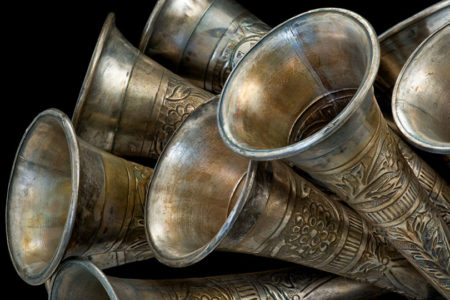Specific Reasons for God’s Anger and Wrath Part Two
Previously we examined the ultimate reason for God’s anger and wrath and several specific reasons for His wrath against Israel. Now we will observe additional specific reasons.
Specific Reasons for God’s Wrath Against Israel
Provocations of King Manasseh. “The Lᴏʀᴅ did not turn from the fierceness of His great wrath, with which His anger was aroused against Judah, because of all the provocations with which Manasseh had provoked Him” (2 Ki. 23:26).
Second Kings 21:2–9 provides the tragic record of those provocations. Manasseh “did evil in the sight of the Lᴏʀᴅ, according to the abominations of the nations whom the Lᴏʀᴅ had cast out before the children of Israel” (v. 2).
For he rebuilt the high places which Hezekiah his father had destroyed; he raised up altars for Baal, and made a wooden image, as Ahab king of Israel had done; and he worshiped all the host of heaven and served them. He also built altars in the house of the Lᴏʀᴅ, of which the Lᴏʀᴅ had said, “In Jerusalem I will put My name.” And he built altars for all the host of heaven in the two courts of the house of the Lᴏʀᴅ. Also he made his son pass through the fire, practiced soothsaying, used witchcraft, and consulted spiritists and mediums. He did much evil in the sight of the Lᴏʀᴅ, to provoke Him to anger. He even set a carved image of Asherah that he had made, in the house of which the Lᴏʀᴅ had said to David and to Solomon his son, “In this house and in Jerusalem, which I have chosen out of all the tribes of Israel, I will put My name forever; and I will not make the feet of Israel wander anymore from the land which I gave their fathers––only if they are careful to do according to all that I have commanded them, and according to all the law that My servant Moses commanded them.” But they paid no attention, and Manasseh seduced them to do more evil than the nations whom the Lᴏʀᴅ had destroyed before the children of Israel” (vv. 3–9).
Because of these provocations, God said, “I will also remove Judah from My sight, as I have removed Israel, and will cast off this city Jerusalem which I have chosen, and the house of which I said, ‘My name shall be there”’ (23:27).
Mocking and scoffing at God’s prophets and despising God’s words. King Zedekiah “stiffened his neck and hardened his heart against turning to the Lᴏʀᴅ God of Israel” (2 Chr. 36:13).
Moreover all the leaders of the priests and the people transgressed more and more, according to all the abominations of the nations, and defiled the house of the Lᴏʀᴅ which He had consecrated in Jerusalem. And the Lᴏʀᴅ God of their fathers sent warnings to them by His messengers, rising up early and sending them, because He had compassion on His people and on His dwelling place. But they mocked the messengers of God, despised His words, and scoffed at His prophets, until the wrath of the Lᴏʀᴅ arose against His people, till there was no remedy (vv. 14–16).
Becoming like dross. “Therefore thus says the Lord Gᴏᴅ: ‘Because you have all become dross, therefore behold, I will gather you into the midst of Jerusalem. As men gather silver, bronze, iron, lead, and tin into the midst of a furnace, to blow fire on it, to melt it; so I will gather you in My anger and in My fury, and I will leave you there and melt you. Yes, I will gather you and blow on you with the fire of My wrath, and you shall be melted in its midst” (Ezek. 22:19–21).
Profaning the Sabbath. After the end of the Babylonian Captivity, Nehemiah accused the Jewish people of bringing additional wrath on Israel by profaning the Sabbath. They were treading winepresses on the Sabbath; bringing in sheaves; and loading donkeys with wine, grapes, figs, and other merchandise that they brought into Jerusalem to sell on that day. Men of Tyre brought in fish and all types of goods to sell on the Sabbath to the children of Judah and Jerusalem (Neh. 13:15–18). They were changing the specific day God intended to be holy (different) into a common business day.
Refusing to meet the spiritual requirement of repentance to enter the future theocratic Kingdom of God. When John the Baptist came as the forerunner of the Messiah, he preached the following message in Judea: “Repent, for the kingdom of heaven is at hand!” (Mt. 3:1–2). That Kingdom was at hand because the Messiah, who could establish it, was in Israel. John’s message indicated the people of Israel needed to meet the spiritual requirement of repentance for God’s promised Kingdom to be established.
When many of the Pharisees and Sadducees and multitudes of people came to John, he said to them, “Brood of vipers! Who warned you to flee from the wrath to come?” (Mt. 3:7; Lk. 3:7). In referring to the wrath to come, John apparently had in mind the wrath of God that would fall on those people of Israel who would not repent of their rebellion against God and His Messiah during the offer of the future theocratic Kingdom.
Trampling underfoot the Son of God, counting His shed blood as common, and insulting the Spirit of grace.
Anyone who has rejected Moses’ law dies without mercy on the testimony of two or three witnesses. Of how much worse punishment, do you suppose, will he be thought worthy who has trampled the Son of God underfoot, counted the blood of the covenant by which he was sanctified a common thing, and insulted the Spirit of grace? For we know Him who said, “Vengeance is Mine, I will repay,” says the Lord. And again, “The Lᴏʀᴅ will judge His people.” It is a fearful thing to fall into the hands of the living God (Heb. 10:28–31).
Instruments of God’s Wrath
In the eighth century B.C. God used Assyria as His instrument of wrath primarily against the northern kingdom of Israel and somewhat against the southern kingdom of Judah. He called Assyria “the rod of My anger and the staff in whose hand is My indignation. I will send him against an ungodly nation, and against the people of My wrath I will give him charge, to seize the spoil, to take the prey, and to tread them down like the mire of the streets” (Isa. 10:5–6).
In the late sixth century and early seventh century B.C., God used Babylon as His instrument of wrath against the southern kingdom of Judah and Jerusalem (Jer. 21:4–7).
Therefore He brought against them the king of the Chaldeans, who killed their young men with the sword in the house of their sanctuary, and had no compassion on young man or virgin, on the aged or the weak; He gave them all into his hand. And all the articles from the house of God, great and small, the treasures of the house of the Lᴏʀᴅ, and the treasures of the king and of his leaders, all these he took to Babylon. Then they burned the house of God, broke down the wall of Jerusalem, burned all its palaces with fire, and destroyed all its precious possessions. And those who escaped from the sword he carried away to Babylon, where they became servants to him and his sons until the rule of the kingdom of Persia (2 Chr. 36:17–20).
Lamentations 2:2–3 expresses the result of God’s wrath: “The Lord has swallowed up and has not pitied all the dwelling places of Jacob. He has thrown down in His wrath the strongholds of the daughter of Judah; He has brought them down to the ground; He has profaned the kingdom and its princes. He has cut off in fierce anger every horn of Israel; He has drawn back His right hand from before the enemy. He has blazed against Jacob like a flaming fire devouring all around.”
Jeremiah 50:17 states, “Israel is like scattered sheep; the lions have driven him away. First the king of Assyria devoured him; now at last this Nebuchadnezzar king of Babylon has broken his bones.”
God withdrew His wrath from Judah when He ended its Babylonian Captivity and restored it to its homeland (Ps. 85:1–3).
Because the generation of Israel to whom Jesus presented Himself as the promised Messiah failed to meet the spiritual requirement necessary for the promised theocratic Kingdom of God to come, Jesus foretold of severe, divine judgment (Mt. 23:34–36). That judgment came when Rome crushed the Jewish revolt that culminated with the Roman destruction of Jerusalem and second Temple in A.D.70 and the massacre of more than 1 million Jewish people. (See Luke 19:41–44.)
Jesus indicated that, at His Second Coming to Earth as the Messiah after the unparalleled time of trouble for Israel and the world, His angels will gather together all the Jewish people scattered throughout the world (Mt. 24:21, 29–31) in preparation for the establishment of God’s promised theocratic Kingdom.(See Matthew 25:31–34.)
In conjunction with this event, God issued the following warning to the people of Israel:
“As I live,” says the Lord Gᴏᴅ, “surely with a mighty hand, with an outstretched arm, and with fury poured out, I will rule over you. I will bring you out from the peoples and gather you out of the countries where you are scattered, with a mighty hand, with an outstretched arm, and with fury poured out. And I will bring you into the wilderness of the peoples, and there I will plead My case with you face to face. Just as I pleaded My case with your fathers in the wilderness of the land of Egypt, so I will plead My case with you,” says the Lord Gᴏᴅ. “I will make you pass under the rod, and I will bring you into the bond of the covenant; I will purge the rebels from among you, and those who transgress against Me; I will bring them out of the country where they dwell, but they shall not enter the land of Israel. Then you will know that I am the Lᴏʀᴅ” (Ezek. 20:33–38).
The fact that God will remove them from the countries where they have been living but not allow them to enter Israel seems to indicate that those who persist in their rebellion will be removed from Earth in judgment. This will be the tragic consequence of refusing to meet the spiritual requirement necessary to enter God’s theocratic Kingdom.
God’s Commitment to Israel
Despite God’s many reasons for meting out wrath on Israel, He is wholly committed to that nation: “‘For I am with you,’ says the Lᴏʀᴅ, ‘to save you; though I make a full end of all nations where I have scattered you, yet I will not make a complete end of you. But I will correct you in justice, and will not let you go altogether unpunished’” (Jer. 30:11).







